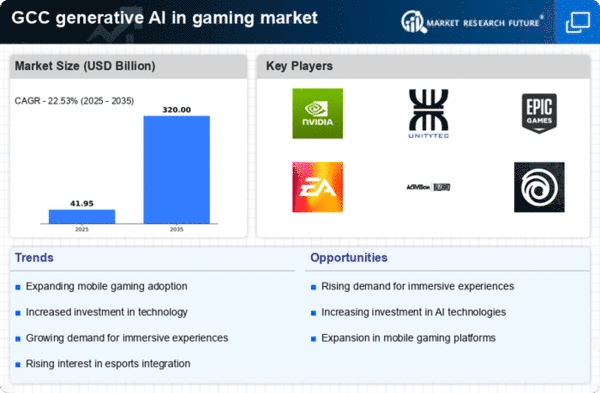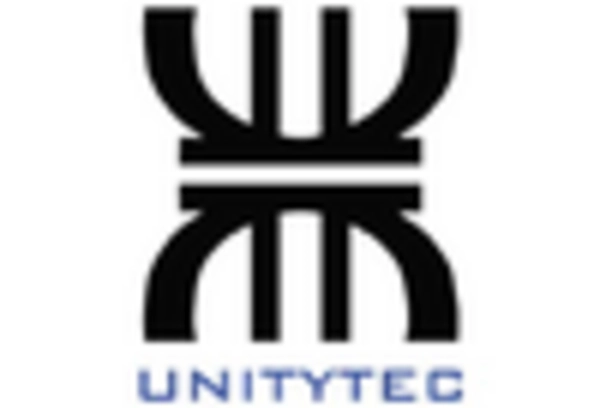Advancements in AI Technology
Technological advancements in artificial intelligence are significantly influencing the generative ai-in-gaming market. Innovations in machine learning and neural networks enable developers to create more sophisticated AI systems that can generate complex narratives and realistic character behaviors. In the GCC, the integration of these technologies is expected to enhance the quality of gaming experiences, making them more appealing to a broader audience. The market for AI in gaming is anticipated to grow at a CAGR of around 30% over the next five years, indicating a robust interest in AI-driven solutions. As developers harness these advancements, the generative ai-in-gaming market is likely to evolve, offering unprecedented levels of creativity and interactivity.
Growing Popularity of Mobile Gaming
The generative ai-in-gaming market is experiencing a shift driven by the growing popularity of mobile gaming in the GCC. With an increasing number of players accessing games via smartphones and tablets, developers are adapting their strategies to cater to this demographic. Generative AI plays a crucial role in optimizing mobile gaming experiences, enabling the creation of lightweight yet engaging content that can be easily accessed on mobile devices. The mobile gaming segment is expected to account for over 50% of the total gaming revenue in the GCC by 2026. This trend indicates a significant opportunity for the generative ai-in-gaming market to expand its reach and enhance user engagement through tailored mobile experiences.
Increased Investment in Gaming Startups
The generative ai-in-gaming market is benefiting from a surge in investment directed towards gaming startups in the GCC region. Venture capitalists and private equity firms are increasingly recognizing the potential of AI-driven gaming solutions, leading to a rise in funding for innovative projects. In 2025, investments in gaming startups in the GCC are projected to exceed $300 million, reflecting a growing confidence in the market's future. This influx of capital allows startups to experiment with generative AI technologies, fostering creativity and innovation. As a result, the generative ai-in-gaming market is likely to see a diversification of gaming experiences, catering to various player preferences and enhancing overall market growth.
Rising Demand for Immersive Experiences
The generative ai-in-gaming market is witnessing a notable increase in demand for immersive gaming experiences among players in the GCC region. As gamers seek more engaging and interactive environments, developers are leveraging generative AI to create dynamic worlds that adapt to player actions. This trend is reflected in the growing investment in AI technologies, with the GCC gaming market projected to reach approximately $1.5 billion by 2026. The ability of generative AI to produce unique content on-the-fly enhances player engagement, potentially leading to longer play sessions and increased player retention. Consequently, this driver is pivotal in shaping the future of the generative ai-in-gaming market, as developers strive to meet the evolving expectations of gamers.
Emergence of Esports and Competitive Gaming
The rise of esports and competitive gaming is a key driver for the generative ai-in-gaming market in the GCC. As esports gains traction, there is an increasing demand for innovative gaming experiences that can attract both players and spectators. Generative AI can enhance competitive gaming by creating adaptive gameplay scenarios and personalized training experiences for players. The esports market in the GCC is projected to grow at a CAGR of 25% over the next few years, indicating a robust interest in competitive gaming. This growth presents an opportunity for the generative ai-in-gaming market to develop solutions that cater to the unique needs of esports, potentially transforming the landscape of competitive gaming in the region.

















